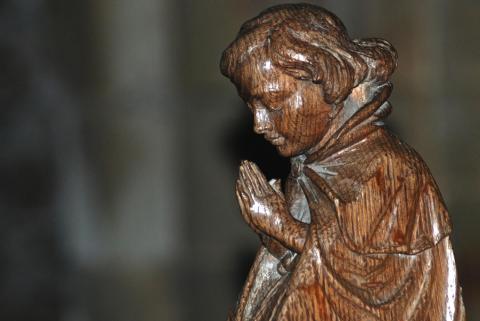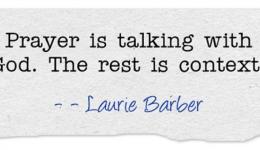Category:
The origin of the word for ‘blessing’ in the ancient Semitic (including Hebrew), was in the root b-r-k. It gave the idea of “kneeling,” as one would kneel before a ruler or one’s better, as favour was given and/or received, or as one knelt as did a camel or a desert wanderer to drink the life-sustaining water of a well at a desert oasis.
In Old English, blesian (to consecrate with blood) gave meaning to the word “to bless.” The French word blesser and blessure for wound or injuries also is rooted in this idea. But the English word “bless” has a different idea then the ancient French usage, for today the French use the word benir or benediction when having the English meaning for blessing.
Whatever the linguistic data may show, Jesus’ works and words are saturated with the idea of blessing, for in taking upon Himself the wounds of our world, our wounds and those of the whole creation, Jesus also heals them – heals us all.
It is Jesus Who makes possible a New Creation, through His life of service and sacrifice and pre-eminently in His ‘finished work’ on the Cross of Calvary. Just as in being God’s Word He created the first creation in which we now live, His finished work of the old and His beginning work of the New makes possible the creating of a New Creation, a new world in which one day we shall live, a new world and order of things of shalom. Even now, Christians are called in some measure to enter and experience some of the realities of this new world, the Kingdom-come and coming, to live in it by faith and obedience and to live it out in good measure, now that we have become “new creatures in Christ Jesus.” But for us still doing so means we will know a life that is no stranger to wounds and sacrifice, still necessary if we are to be blest and to be a blessing.
In the in Beatitudes (in Matthew 5) the Greek word translated “blessed” is makarios. I am taken by the idea of blessing being linked to woundedness, for again: there can be no blessing without sacrifice and suffering. Wounds of what we have done to others and to ourselves and the effects of the world’s brokenness effect us all, coming through us or to us in the sacrifices and wounds of others, whether or not they intend that through them we should receive blessing. Only God can turn wounds into blessings, as He works in us for good . . .
So, what if we were to change the word “blessed” or “blest”[or “happy” as it is sometimes translated) with the word “wounded,” as we re-read the words of the Beatitudes? Then we would have – “Wounded are the merciful. . . .” “Wounded are the peacemakers . . .” “Wounded are those who are persecuted for righteousness sake,” and so on. All these wounds are real and true, and we and others suffer with them; but they are not the end of the story – “for theirs . . .” “for they shall be . . . ”
Jesus’ words of blessing may also be contrasted with his words of cursing or ‘woe!’ to scribes and pharisees and other such hypocrites of His day (and ours). For just as blessings come through wounds, curses come to those who are not willing to sacrifice or to suffer wounds, or who unknowingly or maliciously cause wounds in others, or who pretend to know of no such experiences in their own lives. Lliving as they do with attitudes of entitlement, they are surprised when bad things happen – not to others, but to themselves. After all, they have sought to live pure, perfect lives. But they have not learned that good comes only through sacrifice, through someone’s suffering (for them). They refuse to allow the wounds of others and the wounded-ness of the world to touch them deeply in heart and mind. They refuse to make sacrifices so that others might receive blessing. But they could change their minds (repentance) and seek another perspective and stance. They could look to Christ and humbly receive the benefits of His wounds.









